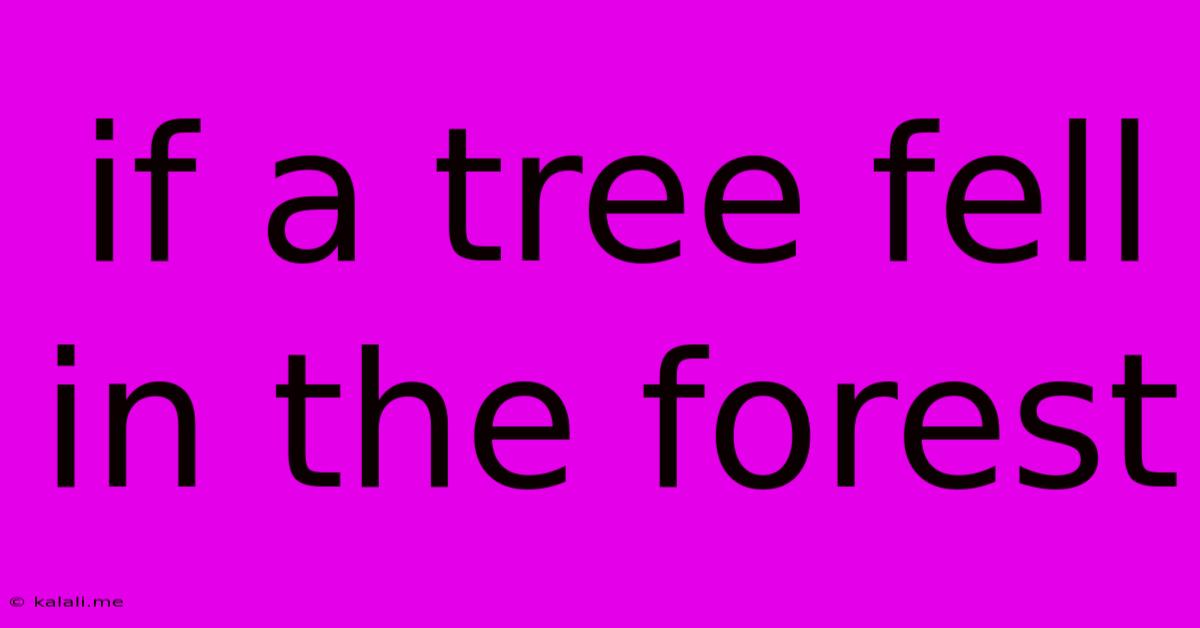If A Tree Fell In The Forest
Kalali
May 30, 2025 · 2 min read

Table of Contents
If a Tree Falls in a Forest and No One is Around, Does it Make a Sound?
The classic philosophical question, "If a tree falls in a forest and no one is around, does it make a sound?" has puzzled thinkers for generations. It's a seemingly simple query that delves into the nature of perception, reality, and the relationship between the observer and the observed. This article will explore the physics, philosophy, and even the surprising ecological implications of this thought experiment.
The Physics of a Falling Tree:
From a purely physical perspective, the answer is a resounding yes. When a tree falls, it creates vibrations in the air – sound waves. These waves exist regardless of whether a sentient being is present to perceive them. The rustling leaves, the cracking branches, the impact of the trunk hitting the ground – all produce sound waves, measurable and demonstrable through scientific instruments. The size and type of tree, the surface it falls on, and the surrounding environment will all affect the intensity and frequency of these sound waves. Therefore, the physical act of the tree falling inherently produces sound.
The Philosophy of Perception:
The philosophical dimension is where things get interesting. The question hinges on the definition of "sound." Is sound merely a physical phenomenon, the creation of sound waves? Or does it require a conscious observer to register those waves as an auditory experience?
- Objectivism: An objectivist perspective would argue that the sound exists independently of perception. The falling tree produces sound waves, and their existence is objective reality.
- Subjectivism: A subjectivist viewpoint suggests that sound only exists as a subjective experience. Without an ear to hear the vibrations, there is no sound.
This philosophical debate highlights the fundamental distinction between objective reality and subjective experience. The tree falling is an objective event, but the experience of sound is subjective.
Ecological Implications of a Falling Tree:
Beyond the philosophical musings, the falling tree has significant ecological consequences. The fallen tree creates a microhabitat, providing shelter and sustenance for various insects, fungi, and other organisms. It enriches the forest floor with nutrients, contributing to the overall health and biodiversity of the ecosystem. The decomposition process of the fallen tree is a crucial part of the forest's nutrient cycle. Thus, even without a human observer, the event of a falling tree profoundly impacts the forest ecosystem.
Conclusion:
The question, "If a tree falls in a forest and no one is around, does it make a sound?" isn't a simple yes or no. Physically, the answer is yes; the falling tree creates sound waves. However, philosophically, the answer depends on your definition of "sound." The very act, regardless of observation, has important ecological repercussions. The question serves as a valuable reminder of the interplay between objective reality, subjective experience, and the interconnectedness of all living things within an ecosystem.
Latest Posts
Latest Posts
-
Skyrim Shroud Hearth Barrow Pillar Puzzle
Jun 01, 2025
-
200 Amp Murray Main Breaker Replacement
Jun 01, 2025
-
Do You Add Ability Modifier To Damage Dnd
Jun 01, 2025
-
How To Drain Boiler Expansion Tank
Jun 01, 2025
-
Precedent Not Binding As To Issue Not Addressed
Jun 01, 2025
Related Post
Thank you for visiting our website which covers about If A Tree Fell In The Forest . We hope the information provided has been useful to you. Feel free to contact us if you have any questions or need further assistance. See you next time and don't miss to bookmark.